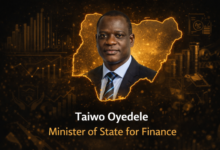Why Prosecution of Fidelity Bank MD was stopped, but case remains open – AGF

In a move steeped in legal prudence and prosecutorial discretion, Nigeria’s Attorney-General of the Federation (AGF) and Minister of Justice, Prince Lateef Fagbemi, SAN, has officially withdrawn criminal charges previously hanging over the Managing Director of Fidelity Bank Plc, Dr. Nneka Onyeali-Ikpe. The AGF’s office insists the decision underscores a deliberate commitment to justice—not exoneration by association.
The statement, issued Monday by the AGF’s media aide, Mr. Kamarudeen Ogundele, is both clarifying and strategic. It distills the rationale behind the AGF’s invocation of nolle prosequi—a constitutional prerogative allowing the chief law officer to discontinue a criminal prosecution when the public interest or miscarriage of justice so demands.
“A comprehensive review revealed that Dr. Onyeali-Ikpe was neither the account officer nor Managing Director at the material time the disputed account was opened,” the AGF’s office stated.
In simpler terms, the timeline cleared her. The account used in the alleged fraudulent scheme—details of which remain shielded under prosecutorial seal—predates Onyeali-Ikpe’s tenure as either a relevant account custodian or chief executive of Fidelity Bank. Therefore, the absence of any direct complicity rendered her continued prosecution unjustifiable in law.
Implications: Not a Blanket Clearance for Fidelity
However, legal insiders are cautioning against reading this as a wholesale vindication of the institution itself. The statement carefully draws a boundary between the MD and the bank, stressing that “this does not exculpate Fidelity Bank from the allegations, which are still pending before the court.”
This means the bank, as a corporate body, remains under scrutiny—and potentially liable—if evidence of institutional failings or negligence emerges during the judicial process. In fact, financial institutions have often been held accountable not just for acts of commission, but for omission, lax compliance frameworks, or weak Know Your Customer (KYC) controls.
The Bigger Picture: Justice or Judicial Theatre?
The decision draws attention to the delicate balancing act the AGF must perform—upholding the rule of law without turning prosecution into persecution. The nolle prosequi tool, while frequently misunderstood, is a critical legal instrument that ensures the state does not expend public resources on legally hollow or ethically questionable pursuits.
But legal analysts say it also places pressure on the judiciary and prosecutors to do their homework. “High-profile cases involving financial institutions require a forensic understanding of timelines, board resolutions, internal control mechanisms, and regulatory filings,” says Dr. A.O. Odinkalu, a former Chairman of Nigeria’s Human Rights Commission. “Prematurely roping in an executive without direct linkage not only undermines credibility, it distracts from the true locus of fraud.”
Reputation at Stake—Corporate Governance Under the Lens
For Fidelity Bank, the development is a reputational sigh of relief—but not an escape from regulatory attention. Stakeholders will now watch closely to see if the remaining aspects of the case uncover systemic compliance breaches or failings in corporate governance. In the age of ESG (Environmental, Social, and Governance) scoring and rising investor scrutiny, banks cannot afford shadows on their AML (Anti-Money Laundering) record.
Meanwhile, for Dr. Onyeali-Ikpe, the AGF’s intervention is a professional reprieve that reinforces a clean record. But public perception is harder to sway. “In an era where reputational capital often matters more than financial capital, leadership must not only be clean, but be seen to be above reproach,” a Lagos-based financial law expert told BRANDECONOMY.
Bottom Line
The AGF’s decision to withdraw the criminal charge against Dr. Onyeali-Ikpe may signal judicial maturity, but the fidelity of the system lies in the full and fair prosecution of the core issues. As the matter progresses in court, Nigerians—and the financial markets—will be watching closely for how justice is balanced with accountability.










